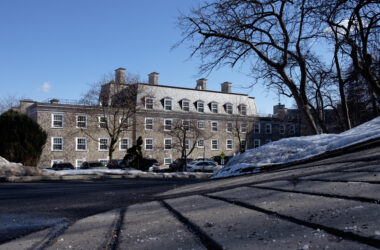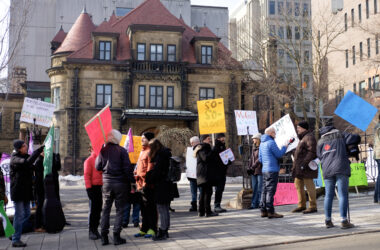
In my last column, I expressed some of my thoughts on the Egyptian revolution. I was initially surprised by the comments and letters which seemed primarily to be personal attacks on me, my religion, and my political beliefs. But as I read through them, I also found many that were respectfully written and constructively critical.
I did not intend to offend anyone and am sorry if anyone was hurt. I have taken many of the criticisms seriously, but a lot of people took my words out of context, and the message I intended to get across was not accurately received.
I did make an error in a particular sentence, which I would like to correct: I said the “only” thing driving the revolution was food, but I should have said “one of the many things” driving the revolution was food. The use of the word “food” was not meant to downplay other causes of Egyptian unrest, but to emphasize the high level of poverty experienced by approximately 40 per cent of the population, and the low percentage of GDP growth—0.21 per cent, compared to 187 per cent in Jordan and 132 per cent in Algeria. Many people felt I had misunderstood the Egyptians’ demands by mentioning poverty as the central cause of the revolution. I fully acknowledge that Egyptians were demanding democratic and human rights as well as an increase in their poor living conditions; however, it would be naive to claim that food was not a primary motivating factor for many Egyptians. Abdel-Wanis, an Egyptian father of six, when asked what his reasons for supporting the revolution were was quoted in the National Post as saying, “For five years I have been looking for my day’s food, and finally I found people to stand with.”
Yes, I am Jewish, as some people kindly pointed out, but when I mentioned the region’s volatility I was not only referring to Israel. As protests have spread to more parts of the Middle East we have seen countries that have not be able to protest as Egyptians did.
I did not intend to suggest that Egyptians do not deserve democracy. I do not see Egyptians as different from me or anyone else. The point I was trying to make is that democracy is a very expensive and time-consuming process. The costs of implementing a democratic system in a poverty-ridden country must be considered.
What was most misinterpreted was why I believe Egyptians do not necessarily want a democracy. While I was watching the news, I often saw Egyptians saying they wanted liberal rights, namely freedom of speech, press, and religion. I support liberal rights and certainly believe we should stand up for them, but democracy does not guarantee anybody those rights. Moreover, having multiple parties, free elections, and voting rights does not necessarily mean that liberal rights will develop in Egypt, or any other country.
I stated, quite controversially, that I do not believe democracy is a human right. I stand by that statement, though I don’t have the space to defend the idea here. However, I do believe democracy is something a society may strive for. I think that, for now, Egyptians should focus on obtaining liberal rights and better living conditions for everyone.
In my first column of the year, I said that I hope to have open dialogue with readers and to discuss new perspectives on issues we care about. I want to thank the readers who took time to write me thoughtful, respectful responses. I feel fortunate to have had the chance to hear different opinions and I hope we can continue this constructive dialogue and help bridge the gaps in our community.








